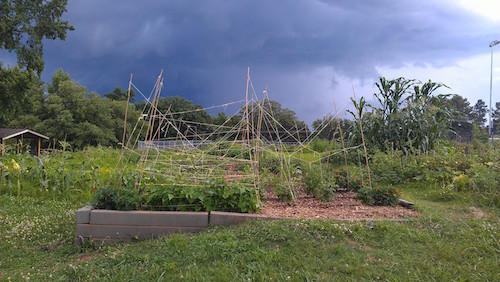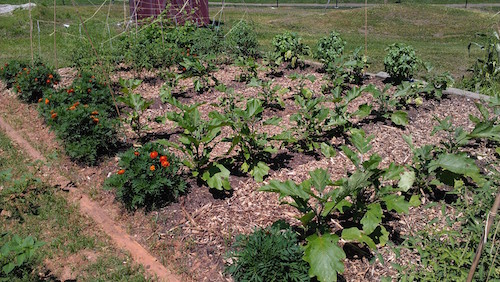Back to the Garden

Photograph by Sheryl Cornett
It's five o'clock, sticky-hot summer in central North Carolina. After several hours in the English department where I teach, I head over to the campus garden. The searing sun infuses each community allotment—lighting up sunflowers, trellised vegetables, weeds, and the veil of humidity. My car radio news reports an update on the Syrian refugee crisis. I unload tools from the shed and wonder, What about the abused civilians, the women and children? The many forms of suffering this crisis continues to generate?
For the first time in years, I am cultivating a production harvest—what was once called a "victory garden”—enough peppers, tomatoes, and eggplant to eat in season and "put by" for winter's stir-fries, soups, stews. Jars of pesto already line the freezer door. The plots provided by our land-grant university offer the bonus of getting to know fellow gardeners: international faculty, staff, and students alongside visiting scholars and their families from many countries, cultures, and faiths.
The fenced-in acre sits across the street from the Islamic Association of Raleigh and the Al-Iman School, Pre-K through Grade 8. As we community gardeners work our rows and raised beds of vegetables and flowers, we hear calls to prayer echo above the city din.
And I do pray. The time in the garden on my knees weeding, pruning, watering, gives me time for thanksgiving—as today, for my daughter Cullen's life: it's been three years since she almost died due to complications from unexpected, extreme, sudden thyroiditis. I rejoice in her restored health, and this somehow mixes with sadness at the mother-child losses, and all human loss, in Syria and elsewhere in the world.
Words from the Book of Common Prayer don't seem quite enough, but they're all I've got in the moment: Lord God . . . you have made all the peoples of the earth for your glory . . . Give [us] . . . a zeal for justice . . . that we may use our liberty in accordance.
My plot-neighbor in the black and silver hijab—no veil—meets my eyes when she walks through the garden gate, and I wonder if she, too, is praying. A man who works in the Islamic association visits his small garden at a far corner of the acre. He wears a long brown robe of coarse-looking weave, not unlike those in photos of Thomas Merton. He harvests eggplant. I learn later it is for baba ghanoush, a dip for pita bread that is sometimes known as eggplant caviar. Since we’ve had a wet spring and summer-so-far, only the Italian couple’s plot bears stunning tomatoes. In my own spot, I’m discouraged by the level of pokeweeds already tangled up in blue morning glory vines which choke the pollinator- friendly coreopsis and yarrow. Trying to cheer me up, a young Fulbright Scholar from Lebanon shows me certain exotic squashes and greens that are bursting into early fullness due to all the rain. He mentions his mother, and how she might pan-fry the slices.
This stirs me. What supplications for family and homeland are my fellow gardeners also remembering as they bend and plant and harvest?
I see two women leave the Al-Iman School and cross the street, one of them pushing a stroller. They chatter, coming through the garden gate, unbuckling the baby to let her roam the paths. As they lean into a raised bed, each woman tucks back—ever so gently—her headscarf while gathering up loads of mint and cucumbers. They keep talking in their own language—not English—lowering their voices. I see the top of the baby's curly dark hair as she wanders between the rows of okra taller than she is, smiling at and singing to the flowers. A memory floats up, a similar scene of my own daughter as a toddler, the same age as the curly-haired girl-baby picking yellow flowers in the campus garden. Both images catapult my mind's eye to imagined news footage of dead children in Syria. Kyrie Eleison.
Perhaps like these women and the little girl, and maybe like others who feed people as part of a parenting vocation or faith community, I see the garden through the lens of my own faith and call to mothering and being mothered, the garden as a connection to nourishment and solace.
And to redemption. A safe haven where I might receive life and pass it on, or get it back from the edge of death. Just a month after her stay in the ICU, my daughter was mulching these beds and paths in sweltering tomato season.
As I recall that terrifying time, I wonder what the two girlfriends will do with all that mint? I wonder if, as I do, they mark family events by what they ate and when and how and where?
Are they, too, fasting and praying according to their faith tradition, as world religious leaders have called the interfaith community to do? To ask for divine intervention and direction as Syria surrenders chemical weapons?
I pull a prickly thistle away from the pole beans it is trying to strangle and remember a conversation.
A class had just ended, and my Muslim-American student—a brilliant nineteen year-old with eyes like smooth obsidian stones—looks out at me from the frame of her gold and cream-silk hijab. She tells me yes, that Muslims, too, continue to pray for "divine assistance" for the situation in the Middle East and especially Syria.
I nod. I say, "What else can we do?" Then we are silent together for a few moments in the empty high-tech classroom, rows of computer screens staring blankly at each other.
Even if we follow news updates to the minute and feel we have a "global understanding" of the situation, any crisis situation, it seems we remain personally powerless to alleviate suffering. Just as, sitting by my daughter's hospital bed, I was powerless to do anything but beg God for mercy while gazing at her linked to tubes and heart monitor.
For Syria, there is diplomacy and international law to enforce—among many other things to do if you're among the powers that be. For the rest of us, what else is there beyond sending money, writing to Obama? What is there besides prayer?
As Syria remains in chronic crisis status, will I remember to pray for parents and children there and everywhere on the long road to safety and recovery and stability? As I pray for my daughter and family and those in my own physical sphere?
I hope so. Maybe I’ll remember while planting and digging and hauling mulch.
At the raw core of my humanity, where else can I go but to the garden, down on my knees to weed the garden and weep with those who weep? And, eventually, I hope, to rejoice.
I watch the two girlfriends hold the hands of the toddler, and walk the paths with their harvest. I think: maybe through prayer, the world can try to get back to the garden. Back—or forward—to a world where war and cosmic atrocities from human to fellow human are no more.
Back to the garden where, as both Christianity and Islam describe paradise before our fall from grace, we might walk together with the Lord in the cool of the evening.

Photograph by Sheryl Cornett


















